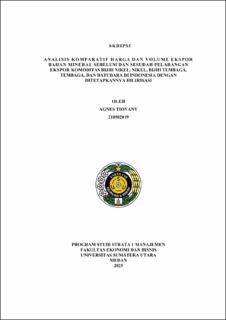Analisis Komparatif Harga Dan Volume Ekspor Bahan Mineral Sebelum dan Sesudah Pelarangan Ekspor Komoditas Bijih Nikel, Nikel, Bijih Tembaga, Tembaga, Batubara di Indonesia Dengan Ditetapkannya Hilirisasi
Comparative Analysis Of Prices And Volume Of Mineral Materials Exports Before And After The Export Ban On Nickel Oil, Nickel, Copper Oil, Copper, And Coal Commodities In Indonesia With The Determination Of Hilirisasi
Abstract
Indonesia, with its abundance of natural resources, makes its people dependent on natural resources and if this continues, it will have a negative impact on the environment. With this problem, the government established new regulations, namely the prohibition of exports of raw mineral materials and downstream policies. Downstreaming is a solution to the newly established regulations to strengthen the domestic industry. This study aims to analyse the differences in the price and volume of mineral exports before and after the ban on exports of nickel ore, nickel, copper ore, copper, and coal commodities in Indonesia with the establishment of downstreaming. The research method used is quantitative with comparative analysis techniques. The data in this study were obtained by accessing annual reports on the value of exports by commodity and the volume of non-oil and gas exports by commodity obtained through the official government website so that this research is secondary data. The sample in this study was 6 commodities. This study uses Paired Sample T-Test and Wilcoxon test analysis tools. The results showed that there were 4 variables that did not experience significant differences, namely Nickel Export Volume, Copper Ore Price, Copper Export Volume, Copper Price, and 8 other variables experienced significant differences, namely Nickel Ore Export Volume, Nickel Ore Price, Nickel Price, Copper Ore Export Volume, Coal Export Volume 1, Coal Price 1, Coal Export Volume 2, Coal Price 2. The export ban regulation does not fully have a good impact on mining and the mining industry itself. Regulation without readiness is futile. Downstreaming as a solution will have a more significant impact when supported by supporting facilities such as smelters. The government is expected to complete the smelter construction process as soon as possible in order to optimise the downstream policy. In addition, the government is expected to be stricter in monitoring the implementation of regulations to prevent illegal actions that can damage the market and the environment.
Collections
- Undergraduate Theses [4611]

